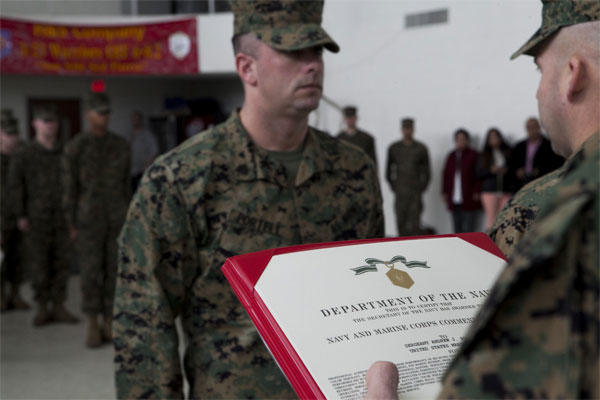BRIDGETON, Mo. -- As any Marine can tell you, earning and upholding the title is no small feat. No matter what a Marine does in life or how long they serve in their beloved Corps, they will always uphold the honor and respect for the Marines that went before them.
Funeral honor details are just one way Marine Forces Reserve members uphold that honor and respect. To them, it is a duty, not a job. They will carry the honors in any clime or place and conduct thousands of these ceremonies every year across the United States.
So when Sgt. Andrew Portell was called to the front of the formation, he had no idea what was going on. It became evident when Sgt. Maj. Brian Fogarty, battalion sergeant major for 3rd Battalion, 23rd Marine Regiment began reading his citation.
“Sergeant Portell coordinated and supervised 1,036 funeral honors for Marine Corps veterans throughout the states of Missouri and Illinois, personally conducting 623 of those funerals…”
It was this feat, among others, that earned him a Navy and Marine Corps Commendation Medal, awarded during a ceremony here, Jan. 7.
“Sergeant Portell is professional -- a model Marine, to be honest with you,” Fogarty said, following the ceremony. “He exemplifies ‘leadership by example.’ His Marines are a direct example of him. He wouldn’t be able to do what he’s done without his Marines, but they absolutely couldn’t have done it without the leadership of Sgt. Portell.”
Portell serves as the funeral honor detail noncommissioned officer in charge, as well as the battalion color sergeant. In those positions, his responsibilities put him intimately in touch with the local community.
“The connections that he’s made, the continuity he has with the funeral homes, airport and community has made a name for him and us as a unit,” Fogarty said.
The battalion funeral detail averages 38 funerals a month, and sometimes up to nine a day, Portell said. That is in addition to the hundreds of color guards each year for ceremonies including funerals, changes of command, Marine Corps balls, as well as charity events like Toys for Tots. The operational tempo is high and he couldn’t have done it without his team.
“We don’t do what we do for medals or ribbons, but when you do get it, it feels good,” he said. “It makes you proud of the job you and your Marines do.”
Portell has written his unit’s standard operating procedure on funeral honor details as well as color guard details and developed a program that has become integral to the identity of the battalion.
“Their team is mission-critical for our unit,” Fogarty said. “We can conduct the funeral honors that they do, but we would shut down as a battalion. As a battalion asset, to shut down means not supporting the companies; not supporting the regiment above you. He executes his duties almost independently. He makes my job a lot easier because I don’t have to be concerned that he misses something.”
There is a real sense of honor and pride to the work they do, said Portell. Everyone should know the feeling and understand what it means to be standing next to the casket of a fallen Marine and fold the flag to present to the family.
“The Marine Corps is a brotherhood; it’s not just something that we say,” he said. “We stand by our Marines. The families thank us for going out of our way, but really it’s just what we do. This is the honor that we take. It has been bestowed on us, so we do it.”



























